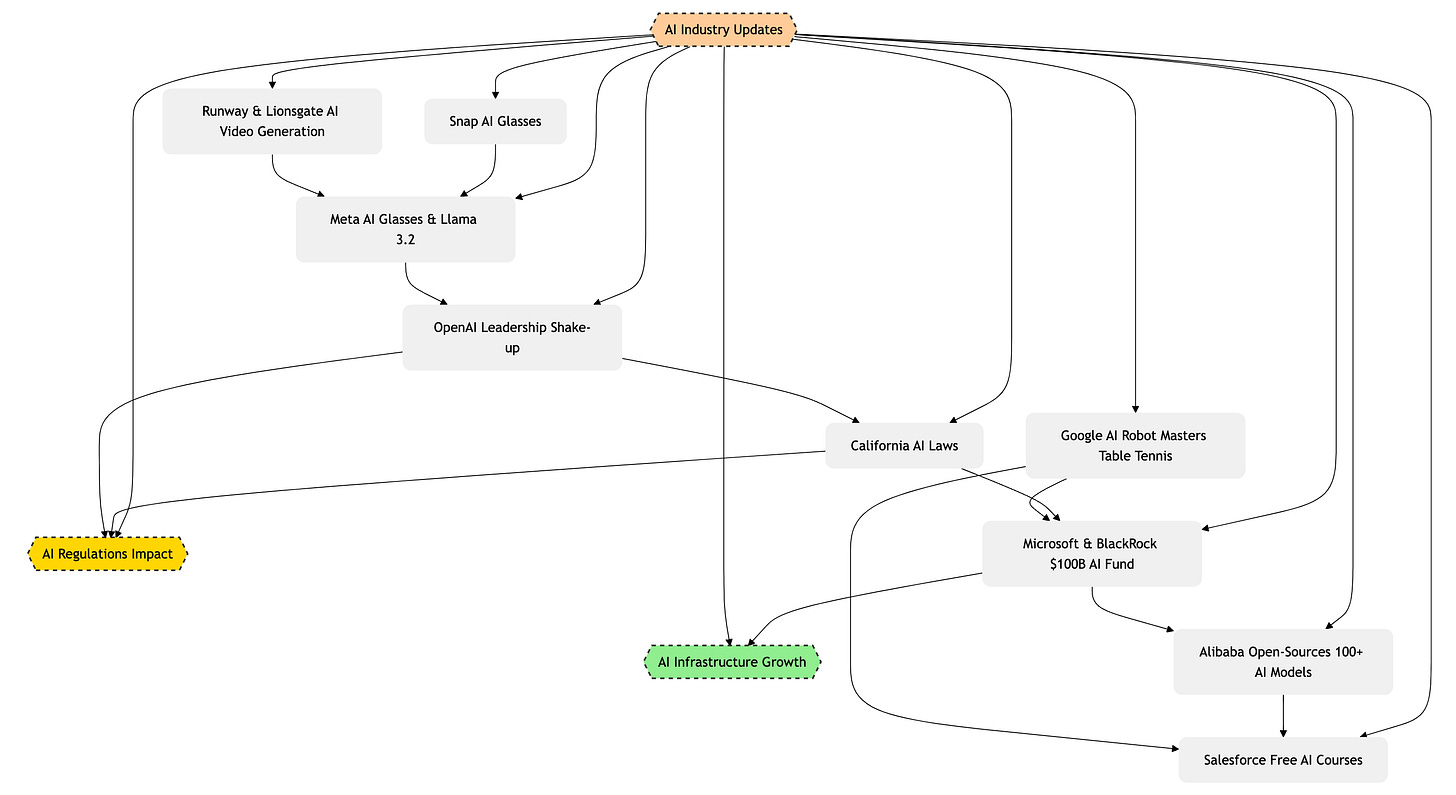Must See AI Industry News This Week - 30 September 2024
California is setting the tone for AI regulation with eight new laws, while OpenAI faces internal turbulence as key leaders depart. Plus, Snap and Meta both launch AI-powered glasses.
Most Interesting This Week
California enacts eight new AI laws: In a precedent-setting move, California passed legislation to regulate AI’s impact on the media and election integrity. These include laws criminalizing the use of AI-generated nude images for blackmail, mandating the labeling of AI-generated election content, and requiring studios to obtain permission for using AI replicas of actors. Governor Gavin Newsom’s signature on these bills places California at the forefront of AI regulation.
Implications: These laws may set a standard for AI regulation in other states, emphasizing ethical concerns and the responsible use of generative AI technologies.
Read the deep-dive I wrote on AI privacy risks and global laws on this topic:
OpenAI Leadership Shake-up: OpenAI's CTO, Mira Murati, resigned amidst potential restructuring, following the departure of several other key figures, including Greg Brockman and Ilya Sutskever. This leadership upheaval raises questions about OpenAI’s future and its ability to maintain its leading position in generative AI.
Business Implications: Such internal changes could disrupt OpenAI’s long-term strategy, affecting both its products and partnerships in the generative AI space.
Read a deeper look at this story:
Snap launches AI-powered Spectacles: Snap's fifth-generation AR glasses, running on Snap OS, feature multi-modal AI for enhanced contextual understanding. While the glasses are a leap forward for cordless AR, they still face challenges with battery life (45 minutes) and field of view (46 degrees). Available to developers in the US for $99/month with a 12-month commitment, these Spectacles mark a significant step in AR and AI device evolution.
Meta Connect 2024 reveals AI-powered AR glasses: Meta announced Orion, a prototype for AI-powered AR glasses, alongside its latest large language model, Llama 3.2, which includes multimodal capabilities and lightweight versions optimized for mobile and edge devices. Orion showcases Meta’s commitment to pushing the boundaries of AR and AI, moving closer to realizing the metaverse. Additionally, Meta introduced Voice Mode for its social platforms, allowing voice-based interactions with its AI systems.
Implications: Orion and Llama 3.2 demonstrate Meta's vision for integrating AI into everyday experiences, with applications that could transform the social media and communication landscape.
AI Business Moves
Microsoft and BlackRock launch AI infrastructure fund: Microsoft and BlackRock have teamed up to create a $100 billion fund to build AI data centers and infrastructure. Previously, the companies launched a $30B Global AI Infrastructure Investment Partnership (GAIIP), highlighting the increasing demand for computational resources to support AI applications.
Implications: These developments solidify Microsoft and BlackRock as key players in building the backbone of the AI industry, addressing the growing need for scalable infrastructure.
Alibaba open-sources over 100 AI models: Alibaba released over 100 Qwen 2.5 AI models, open-sourced for commercial use under the Apache 2.0 license. These models include specialized versions for tasks such as coding and math.
Implications: By making advanced AI models accessible, Alibaba challenges closed-source leaders like OpenAI, potentially accelerating innovation and adoption of AI technologies globally.
Salesforce offers free AI courses and certifications: Through its Trailhead platform, Salesforce is democratizing AI education by offering free courses and certifications. This move aims to equip individuals with AI skills and expand workforce capabilities across sectors.
Implications: Salesforce's initiative could increase AI adoption across industries by reducing the skills gap, allowing more organizations to leverage AI technologies.
AI In Action
Runway and Lionsgate partner for AI-driven video generation: Lionsgate has partnered with Runway to create a custom AI model for cinematic video generation, drawing from the studio’s extensive film catalog.
Implications: AI in content creation could revolutionize filmmaking by lowering production costs and allowing for faster, more efficient workflows, reshaping the future of entertainment.
Google’s AI robot masters table tennis: Google researchers developed an AI-powered robotic arm capable of playing table tennis at a competitive level. The robot analyzes opponent moves and strategies, winning against beginners and splitting matches with intermediate players.
Business Implications: This advancement underscores AI's ability to tackle complex physical tasks, with future applications in industries ranging from industrial automation to healthcare robotics.








